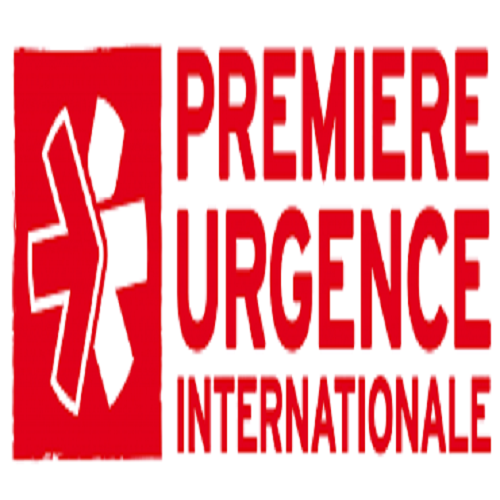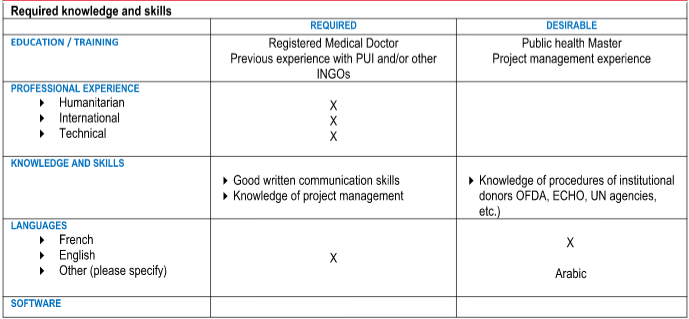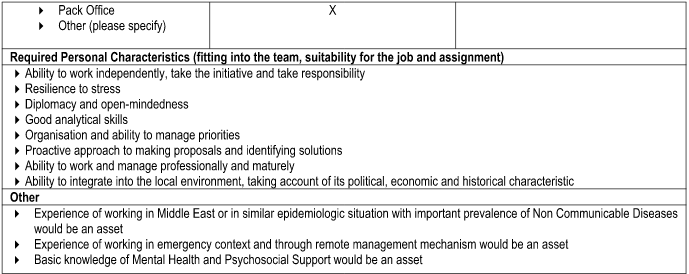Medical Coordinator – Première Urgence Internationale عودة إلى الفرص
Première Urgence Internationale
يطلق Offre d'emploiانتهاء الصلاحية
16 أفريل 2020 Il y a 6 ans
شارك الفرصة على
تفاصيل الفرصة
المجالات المعنيّة بهذه الفرصة: Santé
Job Title: MEDICAL COORDINATOR
Reports to: DEPUTY HEAD OF MISSION – PROGRAM
Country & Base of posting: LIBYA BASED IN TUNIS (TUNISIA)
Creation/Replacement: Replacement
Duration of Mission: 9 months
Context:
Première Urgence Internationale (PUI) is a non-governmental, non-profit, non-political and non-religious international aid organization. Our teams are committed to supporting civilians’ victims of marginalization and exclusion, or hit by natural disasters, wars and economic collapses, by answering their fundamental needs. Our aim is to provide emergency relief to uprooted people in order to help them recover their dignity and regain self-sufficiency. The association leads in average 200 projects by year in the following sectors of intervention: food security, health, nutrition, construction and rehabilitation of infrastructures, water, sanitation, hygiene and economic recovery. PUI is assisting around 7 million people in 22 countries – in Africa, Asia, Middle East, Eastern Europe and France.
Crisis context
After an armed and civil uprising ended Muammar al Gadhafi’s regime in late 2011, the authorities have had difficulties to address pressing security issues, reshape the country’s public finances, or create a viable framework for post-conflict justice and reconciliation. Thus, since 2014, non-state armed groups have disrupted Libya’s political transition. In 2018, continued political instability, ongoing-armed conflict in Libya, particularly internal struggles between local militias, and the collapse of economy, have led to deteriorating living conditions and reduced access to essential services in most of the country. Civilians continue to suffer from unsafe living conditions, with little or no access to health care services, essential medicines, safe drinking water, shelter and education.
In 2019, the whole population is still affected by the armed conflict and the lack of a functioning government, and 823 000 people will still need humanitarian assistance (including 554,000 people in need of health care services) throughout the whole assessed territory in Libya. The complex humanitarian crisis is primarily driven by the absence of the rule of law, lack of access to basic services, displacement of population, the collapse of the economic system and the financial crisis. On April 4th 2019, the Libyan National Army (LNA) under the guide of General Haftar, announced the beginning of a large scale offensive against the Government of National Accord (GNA) in Tripoli. Soon after, the southern neighbourhoods of the city were engulfed in the conflict. To date, continued clashes, involving the use of heavy weaponry and airstrikes, affected 500,000 people, and displaced over 100,000 people within the Libyan capital, to the neighbouring cities, and, more recently to Tunisia.
Throughout 2018, in Benghazi and its surroundings, the situation remains calm even though heavy fighting took place in other towns of the country (Darnah, Ajdabiya, Tripoli, and Sabha). After two year of siege, the LNA launched an attack on Darnah in May 2018. Then, Haftar announced the capture of the city in June; however, clashes were still ongoing in a small part of the town in November 2018. Near to Ajdabiya, fights erupted in June 2018, when the forces conducted by Ibrahim Jadhran attacked the oil facilities in the oil crescent, under the LNA forces. These fights conducted to some population movements in eastern Libya. However, the overall number of IDPs did not change significantly throughout the year – increasing and decreasing at times – while the total number of returnees has progressively increased. Late in 2018, Benghazi is still the town hosting the highest number of IDPs (25,665 individuals), as well as knowing the highest number of returnees (188,625 individuals) in Libya. Thus, Benghazi appears to be, with Tripoli, one of the two main cities to host the more IDPs. The area appears to be particularly vulnerable locations due to the high damage inflicted by three years of heavy clashes. Among the IDPs population, the Tawergha community living in the camps in Benghazi and its surroundings, is entering its 8th year of displacement with few real chances to return their areas of origin soon. Darnah is the fifth town of returns with 23,863 individuals.
The violation of human rights and humanitarian law, including violations of the right to life, and of children and women’s rights, are widespread, including of Gender-based Violence. There are alarming levels of gender-based violence and grave violations of child and women’s rights in the current context.
Still in the same area, since April 2019 the situation remained relatively stable, allowing the PUI program’s to progress with minimum interference. However, this fragile equilibrium could be rapidly overturn depending on the evolution of conflict. Premiere Urgence Internationale (PUI) is monitoring closely the events and, is evaluating potential scenarios in order to plan for contingency in case the security situation deteriorates.
In the Southeast of the country, the tensions between the Tebu and the Zway tribes seriously affects the health system and the access to basic services. Tribe communities, when they are a minority in the area, are suffering from segregation in most of Al Kufrah’s institutions, including health care facilities. This occurs in a context of underdevelopment and poverty that exacerbates the impact of the conflict on the population in the region. Indeed, this area has been suffering, even before the conflict, from a poor investment from the central government. However, few information are available on this area and its humanitarian needs due to a poor, if not almost inexistent, presence of NGOs.
Besides, in the Libyan context, migrants, refugees and asylum seekers leaving outside and within the detention centres (DCs) represents another significant vulnerable group in Libya. Estimated to be around 700,000 to 1 million, they are among the most vulnerable population in the country and are currently facing acute needs. This includes an estimated number of migrants in 55 DCs of 5,000 to 7,000 people at the end of 2018. These persons, including both asylum seekers and refugees, have been consistently identified as being the most vulnerable individuals throughout Libya for several reasons. In particular, they are identified as having reduced access to, and availability of life-saving assistance. Additionally, various report show that refugees and asylum seekers in Libya face significant protection concerns, with their status making them particularly vulnerable to abuse, marginalisation, and exploitation. Those who move through the country are exposed to widespread abuses and human’s rights violation along the route. Due to their irregular status, lack of domestic support networks, impunity for crimes committed against foreign nationals, racism, xenophobia and policies linked to the control of mixed migrations flows in Europe, they are highly vulnerable and in need of humanitarian assistance.
Due to the security context, the majority of the humanitarian intervention in Libya are being managed remotely from Tunis.
PUI’s strategy/ current programs
Since May 2016 and the beginning of the exploratory mission, PUI still identifies the support to the health system and the improvement of access to health care as some of the major needs for the eastern Libyan population along with its ongoing field intervention. This analysis has been confirmed by the 2019 HNO, which defines the access to critical services (including public healthcare services and Wash facilities) as the second key humanitarian priority need, with the health sector being the one with the highest number of people in need (554,000 individuals). In conflict-affected areas, public healthcare services have been heavily affected, due to both fighting and governance failures. IDP, returnees, and local communities face challenges to access healthcare services.
PUI Libya mission has started implementing operations in East of Libya (Benghazi area) in 2017 and developed an emergency health response that provides primary health care services to the most vulnerable population. PUI’s intervention focuses on health care through the deployment of Mobile Health Teams (MHT) delivering direct services to internal displaced populations, the host communities, migrants, refugees and asylum seekers. PUI Health intervention consists of general practitioners consultations, adequate treatment provision, sexual and reproductive health services, integrated management of Childhood Illness, psychosocial support interventions. Furthermore, PUI is reinforcing sensitization, communication and prevention on health and hygiene related topics within the communities. To date, PUI has three mobile health teams operating in the entire eastern Libya, two of which targeting vulnerable Libyan communities and one targeting refugees and asylum seekers in six formal detention centres. Since 2018, PUI has extended its area of intervention to in the north eastern Mantikas namely Al Wahat (Ajdabiya Baladiya), Al Marj, Al Jabal Alakhadar, Darnah and Al Butnan (Tubruq Baladiya) to better reach out the most vulnerable.
In 2019, PUI Benghazi office is starting a new project called Evidence Based NCD care, a model for PHC in Libya with the objective to enhance access to Non-Communicable Disease health services in the PHC level in the target area. The project includes 2 health facilities and 2,000 patients will benefit from the services.
In the view to extend its operational coverage in 2018, PUI conducted an exploratory mission in the Al Kufrah region (southeast Libya) in order to identify the specific needs of this isolated area and develop an adapted humanitarian response. Thus, PUI intends to implement comprehensive health related activities to ensure a continuous access to essential care. PUI’s Al Kufrah’s action will combine three levels of intervention: (1) Direct service delivery of primary health care by one MHT through an outreach approach targeting the vulnerable population, (2) At community level, PUI will deploy a network of community health workers (CHW) that will facilitate and optimize the work of the MHT through sensitisation, screening and referral activities; and (3) At health facility level via technical support. The operation will start in Autumn 2019 after a three-month inception phase including capacity building of the team and installation of a PUI office, composed of a full management and health team.
Finally, PUI is working on the reinforcement of the local emergency response capacity through the participation in the development and the implementation of a Health Rapid Response Capacities in Benghazi city, including passive monitoring (EWARS) and deployment of PUI teams for rapid assessments and to support the national emergency response in case of confirmed alert.
In 2018, PUI has also enhanced its strategy of intervention. Although the focus remains health and direct service delivery, it includes other related sectors and approaches to ensure an integrated response. Thus, PUI conducted several rehabilitation projects in order to allow the reactivation of primary health care centres and the functioning of the Al Jalaa Hospital’s emergency room (the main trauma centre of Benghazi. Additionally the rehabilitation projects also led the restarting of a water pumping station in a conflict-affected area of Benghazi and the reactivation of the only laboratory providing drugs and food quality testing in the eastern Libya. Rehabilitations within the refugee’s detention centres have also been implemented to meet the Wash minimum standards for the detainees.
Job Description
Overall objective
The Medical Coordinator is responsible for the success of the mission’s medical strategy and the quality of current and future medical programmes at the definition, implementation and evaluation phases.
She/he provides support to programme managers (Deputy Field coordinator Programs and PMs – field officers) who report to them based on a dotted-line relationship.
Tasks and Responsibilities
- Strategy: Working alongside the Deputy Head of Mission Program and cooperating closely with the Headquarter – Technical Department. She/he contributes to the development of new medical initiatives for the mission. She/he carries out epidemiological monitoring for the country and analyses strengths and weaknesses from the point of view of public health.
- Programmes: She/he ensures that medical programme(s) are in line with PUI’s health policy and monitors them for quality and efficiency.
- Representation: She/he represents the mission to partners, authorities and local stakeholders involved in implementing medical programmes.
- Human Resources / Training: She/he participates in the recruitement of the medical team and supervises technically the medical team.
- Logistics and Administration: She/he ensures the activities she/he is supporting comply with PUI logistical and administrative procedures.
- Safety: She/he contributes to compliance with safety rules within the mission and communicates any safety-related information to the Head of Mission. She/he ensures healthcare is provided for expatriate and national staff involved in the mission.
Specific objectives and linked activities
DEVELOP AND MONITOR MISSION’S HEALTH STRATEGY
She/he contributes to the development of the mission’s operational medical strategy in line with PUI’s health policy and the country’s national health policy.
She/he submits any proposals for the development of new medical activities in new areas of operation to her/his line manager and the Headquarter – Medical/ technical Department.
She/he ensures that the medical activities of the mission’s programmes comply with PUI’s health policy and operational framework.
She/he ensures tools and practices across the whole – mission are harmonised and capitalised in relation to PUI tools and helps to update them in conjunction with the Headquarter – Technical Department.
She/he ensures that epidemiological data, medical protocols, national health policy and assistance programmes from key players in the health sector (WHO, UNICEF, UNFPA, UNAIDS, etc.) are shared and analysed in conjunction with the Headquarter – Medical Department.
She/he promotes the production (publication) of research documents relating to the mission where appropriate, in conjunction with the Headquarter – Medical Department.
She/he attends external coordination meetings as an active contributor. She/he organises annual reflection and strategic development workshops with the mission’s medical staff as necessary.
MONITOR THE MISSION’S MEDICAL PROGRAMME(S)
- She/he provides continuous information to the DHoM program and project managers on new directions on medical policies at a national level and within PUI.
- She/he ensures reports on medical activities, in particular in relation to epidemiological data, consumption of medical supplies, and that indicators and results of the mission’s medical programmes are monitored and analysed.
- She/he supervises the – medical activities, including project and site visits, monitoring the quality of care, meeting medical staff and organising meetings and trainings for medical staff.
- She/he provides technical support for programmes by responding to technical questions, analysing medical strategy and identifying solutions to problems.
- She/he contributes to adapting implementation and monitoring methods for medical activities on projects ran by the mission.
- She/he ensures that orders for medical equipment, medicines and consumables are appropriate to programme requirements and local constraints (country certification, health monitoring, etc.).
- She/he communicates internal and external reports to the DHoM Program and Headquarter – Technical Department in line with internal approval timescales (situation report) and external contractual deadlines (project reports).
PROVIDE TECHNICAL SUPPORT TO THE MEDICAL TEAM
- She/he is the technical supervisor of the health project managers and pharmacist at mission level.
- She/he designs job descriptions of technical poistions.
- She/he potentially contributes to department meetings and participates in definition priorities and activity schedules.
- She/he is involved in the recruiting of the members of medical team and participates in the end of contract process for positions under his/her technical area.
- He/She ensures the continued training of the local medical team (organizational, methodological and potentially technical support), participates in the identification of training needs and recommends training action internally or externally.
REPRESENT PUI TO KEY PLAYERS IN THE HEALTHCARE SECTOR
- She/he represents the -organization to key national and local players (NGOs, health authorities and institutional stakeholders) involved in implementing medical programmes and ensures good relationships are maintained with each of them .
- In the event of a visit by a donor, she/he plays an active role in preparing and managing the visit.
ENSURE THE SAFETY OF PROPERTY AND PEOPLE
- She/he contributes to gathering information relating to safety in the mission’s area of operation and disseminates this on a regular basis or ad hoc in the event of an emergency.
- She/he ensures that the medical teams have access to safety equipment appropriate to their activities (e.g. PEP kits, gloves, etc.).
- She/he participates, as necessary, in managing medical evacuations in conjunction with the Administration and Finance Coordinator, Head of Mission and Head Office.
CONTRIBUTE TO THE DEVELOPMENT OF NEW PROPOSALS
- He/She participates in and/or supervises exploratory missions in conjunction with the Head of Mission, Deputy Head of mission programs and Deputy Head of Mission.
- He/She provides analysis of the healthcare coverage provided by health authorities and NGOs in the country.
- He/She participates in identifying healthcare needs in conjunction with the project teams.
- When defining new operations, he/she works with the project teams to prepare and draft project proposals for health-related activities.
- He/She participates in drafting the mission’s annual action plan.
Conditions
انتهت صلوحية الفرصة
للأسف هذه الفرصة لم تعد موجودة على جمعيتي . زوروا بانتظام قسم الفرص لتجنب افلات الفرص اللاحقة
للاتصال
تابع "جمعيتي" على لينكد إن
احصلوا على جمعيتي موبايل من الآن

عرض شغل منشور على "جمعيتي" في 14 février 2020
إكتشف المزيد من الفرص على "جمعيتي" عبر النّقر على هذا الرّابط.






